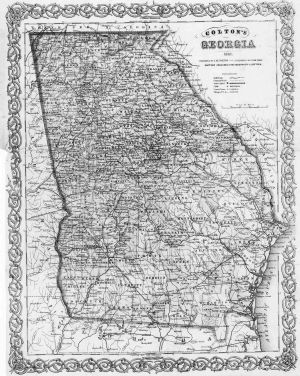 Archibald Harrison Holland of Georgia, who turned 17 three weeks ago, today attends an enlistment rally for the Confederate Army—a turning point for him and a juncture of anguish for his mother who refuses to let her oldest son go gently into the war environs.
Archibald Harrison Holland of Georgia, who turned 17 three weeks ago, today attends an enlistment rally for the Confederate Army—a turning point for him and a juncture of anguish for his mother who refuses to let her oldest son go gently into the war environs.
“He became so enthused on this occasion that he immediately joined Company I, 24th Ga. Regiment, Wofford’s Brigade, Longstreet’s Corps, Lee’s army,” wrote Gwinnett County historian James C. Flanigan years later. “His mother, hearing of her son’s joining the army, mounted a horse and started after him, but was not able to catch up with the young soldier. He, together with the other volunteers, spent the first night at the Lawrenceville campground, and then moved on to Virginia.” They stop first at Lynchburg and then are sent to North Carolina for coast guard duties.
Little is known of Holland’s mother other than that she is fiery enough to make a last ditch effort to pull her oldest son from the clutches of a fate she feared maybe worse than death. Arch Holland will live to tell his war tales and marry three times and have numerous children—and become a Baptist preacher, a farmer, and a man with a desire to help others help themselves.
But today, Arch is bound for some kind of glory and the what ifs of an indefinite battlefield loom far more real in the mind of his mother than in his as he thinks over the discourse he’s heard of late. Just yesterday the Georgia Telegraph published an editorial reflecting the high tide of confidence in which his fellow Southerners are reveling. Right now the idea that “If I don’t go now, I might miss the whole war!” has possessed many a young man.
Wrote the Telegraph editor: “Three months of field warfare with the Northern hosts have been followed with results as favorable as any Southern patriot could ask.—Three months of actual campaigning have covered the South with glory, and filled the North with shame and confusion. An enemy which started out ninety days since, confident of overrunning and subjugating the whole country … is now doubtful and despondent—ready to admit that they cannot cope with us on equal terms and extremely doubtful whether they can successfully met us at all. Three months of campaigning end with the Southern blood up at fever heat, and volunteers rushing to our victorious standards with unsurpassed numbers and ardor.”
Ebullient rhetoric had prevailed at the spirited rally Arch attended and he’d been swept up on a forceful wave of exuberant patriotism. Holland was one of hundreds who couldn’t wait to join the regiment being recruited from White, Banks, Towns, Rabun, Gwinnett, Elbert, Habersham, and Hall counties.
Arch Holland’s left behind family, on the other hand, is worried as Holland launches forth, carrying the concern of parents Isaiah Samuel and Malissa Bennett Holland (married 31 March 1838 in Forsyth County) and the love of seven siblings ranging from older sister Elizabeth to baby Edward. Born 2 August 1844, Arch is their second child and first in a string of seven boys. One more daughter will join the circle. In the meantime, Sam Holland—born in Pendleton, SC, in 1824—will continue offering his services as a wheelwright erecting wheat/corn mills around Hall County’s Hog Mountain community.
Today as son number one signs on a fateful dotted line, Malissa Holland, who is about five years older than her husband, is brimming with dread, clinging to hope, and uttering prayers. Soon a second son will follow. Did mom let him go willingly? No story survives of that parting.
But, both sons return and marry and raise children for the grandparents to love. Sam Holland dies in 1873 and Malissa in February 1896. She is buried at New Bethany Baptist Church on Holiday Road in Hall County’s Oakwood community where son A. H. Holland, about fifteen years down the road, becomes pastor.
Story written by Arlette Copeland, Special Collections Assistant, Jack Tarver Library Special Collections, Mercer University, Macon, GA
Sources: “24th Georgia Volunteer Infantry,” Wikipedia; Archibald Harrison Holland biographical file, Mercer University Tarver Library Special Collections, Macon, GA; “Forward to Washington,” The Georgia Telegraph, 23 August 1861; History of Gwinnett County Georgia 1818-1960, J. C. Flanigan, 1959, page 489; New Bethany Baptist Church, Hall County, Microfilm Reel 659.


